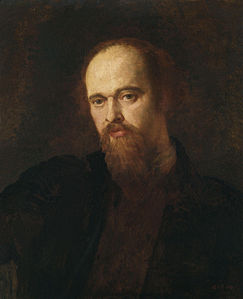Ave
Mother of the Fair Delight,
Thou handmaid perfect in God's sight,
Now sitting fourth beside the Three,
Thyself a woman-Trinity,—
Being a daughter born to God,
Mother of Christ from stall to rood,
And wife unto the Holy Ghost:—
Oh when our need is uttermost,
Think that to such as death may strike
Thou once wert sister sisterlike!
Thou headstone of humanity,
Groundstone of the great Mystery,
Fashioned like us, yet more than we!
Mind'st thou not (when June's heavy breath
Warmed the long days in Nazareth,)
That eve thou didst go forth to give
Thy flowers some drink that they might live
One faint night more amid the sands?
Far off the trees were as pale wands
Against the fervid sky: the sea
Sighed further off eternally
As human sorrow sighs in sleep.
Then suddenly the awe grew deep,
As of a day to which all days
Were footsteps in God's secret ways:
Until a folding sense, like prayer,
Which is, as God is, everywhere,
Gathered about thee; and a voice
Spake to thee without any noise,
Being of the silence:—“Hail,” it said,
“Thou that art highly favourèd;
The Lord is with thee here and now;
Blessed among all women thou.”
Ah! knew'st thou of the end, when first
That Babe was on thy bosom nurs'd?—
Or when He tottered round thy knee
Did thy great sorrow dawn on thee?—
And through His boyhood, year by year
Eating with Him the Passover,
Didst thou discern confusedly
That holier sacrament, when He,
The bitter cup about to quaff,
Should break the bread and eat thereof?—
Or came not yet the knowledge, even
Till on some day forecast in Heaven
His feet passed through thy door to press
Upon His Father's business?—
Or still was God's high secret kept?
Nay, but I think the whisper crept
Like growth through childhood. Work and play,
Things common to the course of day,
Awed thee with meanings unfulfill'd;
And all through girlhood, something still'd
Thy senses like the birth of light,
When thou hast trimmed thy lamp at night
Or washed thy garments in the stream;
To whose white bed had come the dream
That He was thine and thou wast His
Who feeds among the field-lilies.
O solemn shadow of the end
In that wise spirit long contain'd!
O awful end! and those unsaid
Long years when It was Finishèd!
Mind'st thou not (when the twilight gone
Left darkness in the house of John,)
Between the naked window-bars
That spacious vigil of the stars?—
For thou, a watcher even as they,
Wouldst rise from where throughout the day
Thou wroughtest raiment for His poor;
And, finding the fixed terms endure
Of day and night which never brought
Sounds of His coming chariot,
Wouldst lift through cloud-waste unexplor'd
Those eyes which said, “How long, O Lord?”
Then that disciple whom He loved,
Well heeding, haply would be moved
To ask thy blessing in His name;
And that one thought in both, the same
Though silent, then would clasp ye round
To weep together,—tears long bound,
Sick tears of patience, dumb and slow.
Yet, “Surely I come quickly,”—so
He said, from life and death gone home.
Amen: even so, Lord Jesus, come!
But oh! what human tongue can speak
That day when Michael came to break
From the tir'd spirit, like a veil,
Its covenant with Gabriel
Endured at length unto the end?
What human thought can apprehend
That mystery of motherhood
When thy Beloved at length renew'd
The sweet communion severèd,—
His left hand underneath thine head
And His right hand embracing thee?—
Lo! He was thine, and this is He!
Soul, is it Faith, or Love, or Hope,
That lets me see her standing up
Where the light of the Throne is bright?
Unto the left, unto the right,
The cherubim, succinct, conjoint,
Float inward to a golden point,
And from between the seraphim
The glory issues for a hymn.
O Mary Mother, be not loth
To listen,—thou whom the stars clothe,
Who seëst and mayst not be seen!
Hear us at last, O Mary Queen!
Into our shadow bend thy face,
Bowing thee from the secret place,
O Mary Virgin, full of grace!
Font size:
Submitted on May 13, 2011
Modified on March 14, 2023
- 3:41 min read
- 118 Views
Quick analysis:
| Scheme | Text too long |
|---|---|
| Closest metre | Iambic tetrameter |
| Characters | 3,860 |
| Words | 721 |
| Stanzas | 1 |
| Stanza Lengths | 112 |
Translation
Find a translation for this poem in other languages:
Select another language:
- - Select -
- 简体中文 (Chinese - Simplified)
- 繁體中文 (Chinese - Traditional)
- Español (Spanish)
- Esperanto (Esperanto)
- 日本語 (Japanese)
- Português (Portuguese)
- Deutsch (German)
- العربية (Arabic)
- Français (French)
- Русский (Russian)
- ಕನ್ನಡ (Kannada)
- 한국어 (Korean)
- עברית (Hebrew)
- Gaeilge (Irish)
- Українська (Ukrainian)
- اردو (Urdu)
- Magyar (Hungarian)
- मानक हिन्दी (Hindi)
- Indonesia (Indonesian)
- Italiano (Italian)
- தமிழ் (Tamil)
- Türkçe (Turkish)
- తెలుగు (Telugu)
- ภาษาไทย (Thai)
- Tiếng Việt (Vietnamese)
- Čeština (Czech)
- Polski (Polish)
- Bahasa Indonesia (Indonesian)
- Românește (Romanian)
- Nederlands (Dutch)
- Ελληνικά (Greek)
- Latinum (Latin)
- Svenska (Swedish)
- Dansk (Danish)
- Suomi (Finnish)
- فارسی (Persian)
- ייִדיש (Yiddish)
- հայերեն (Armenian)
- Norsk (Norwegian)
- English (English)
Citation
Use the citation below to add this poem to your bibliography:
Style:MLAChicagoAPA
"Ave" Poetry.com. STANDS4 LLC, 2025. Web. 11 Mar. 2025. <https://www.poetry.com/poem/7502/ave>.






Discuss the poem Ave with the community...
Report Comment
We're doing our best to make sure our content is useful, accurate and safe.
If by any chance you spot an inappropriate comment while navigating through our website please use this form to let us know, and we'll take care of it shortly.
Attachment
You need to be logged in to favorite.
Log In